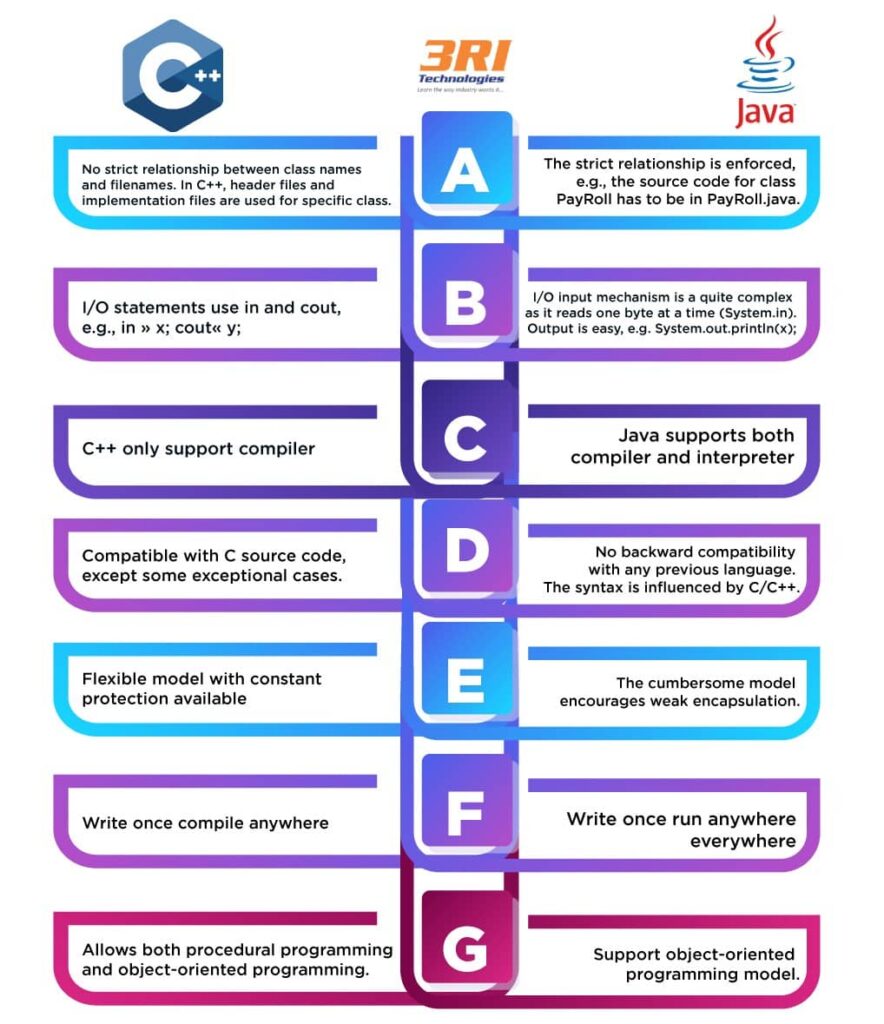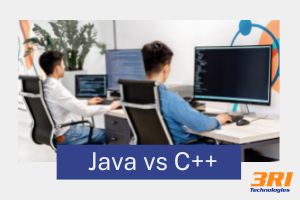Java was first introduced in 1995 and is a general-purpose, object-oriented programming language. Java is the foundation of millions of programs and websites. It is quick, safe, and dependable. Java is platform neutral and runs on any machine via a compiler. Java is used in laptops, data centers, game consoles, professional supercomputers, smartphones, internet browsers, and websites. Java was used to create Wikipedia, Minecraft, Android Software, LinkedIn, Uber, and the Mars Rover Controller.
Choosing your first or next programming language is a critical decision, and the classic C++ vs Java debate is often at the center of that choice. Both Java and C++ are incredibly powerful, but the fundamental difference between cpp and java lies in their design philosophy, memory management, and platform dependency. For many aspiring developers looking to build robust, platform-independent applications, mastering Java is an excellent career move. Enrolling in focused training like our Java Classes In Pune provides the structured learning needed for success. In this article, we’ll explore the key differences between Java and C++ to help you decide which language is right for you.
Comparing Performance, Memory Management, and Real-World Applications
C++ is an object-oriented programming language that creates apps, websites, and other things. C++ programming was made in 1985 to introduce classes to C. C++ allows programmers greater access to system resources like memory. C++ was created so that programs might be written. Once and anywhere, compilation C++ isn’t platformed agnostic.
C++ best suits software systems, low-level application development, gaming, & native programming. C++ thrives in oversized and fast software like corporate systems that manage enormous volumes of data like library, employees, and reservations. C++ was used to develop Apple OS, Firefox, Photoshop, Spotify, Amazon, & Youtube.
The Parallels Between C++ and Java
Java and C++ are computer languages that are similar in terms of type, use, and complexity. Java and C++ could be used to build apps, operating systems, internet browsers, and website components. They also have comparable syntax, which means they are written similarly. Consider Portuguese and Spanish as two distinct languages with certain similarities. Java Both C and C++ use the same primitive data types and many of the exact keywords. Java and C++ are both object-oriented programming languages. This is a dynamic logic style that allows for:
Object inheritance in classes
- Polymorphism (programs that use a function for more than one purpose)
- Abstract concept (the ability to represent essential features without having to include background details)
- Articulation (allows data and processes to be wrapped into a single unit)

The Differences Between C++ and Java
There are numerous distinctions between java vs. c++, some more subtle than others—the difference between c++ and java in terms of platform dependencies, memory management, and class usage. C++ is platform-specific and must be compiled on each platform. Java is platform agnostic. Once completed, it could be executed on every platform when converted to bytecode. Memory management in Java is system-controlled, whereas memory management in C++ is manual.
Java includes comment support, allowing developers to offer documentation inside their source code. Documentation comments are not supported in C++.
C++ is both procedural and object-oriented, whereas Java is entirely object-oriented. Java has a proper root hierarchy, whereas C++ lacks a specific root hierarchy. Most object-oriented programming languages employ a single-rooted hierarchy, in which all classes derive direct or indirect from a single root. However, to enable multiple inheritances, C++ was intended to have no object hierarchy. It’s a handy feature for making libraries.
Another difference between these two languages is how classes were implemented. Because file names are used as classes in Java’s source code, file names should resemble any classes. C++ source code, on either hand, is unrelated to filenames.
C++ gets along well with other computer languages. C++ is based on C and is compatible with most high-level programming languages. C++ makes it simple to write patches or supplement client-side code. Despite being influenced by C and C++, Java is incompatible with other languages.
How do developers utilize Java?
Java may be used to create a wide range of high-level applications. Java is most commonly used for gaming, websites, and applications. Java powers millions of cellular telephones, televisions, and workplace computers worldwide. apps, and much more
You can use Java to create:
Android & Google OS mobile applications – IoT devices – Java connects mobile phones, televisions, laptops, or tablets to machines or equipment at home or in sectors like healthcare, security, utility, supply-chain management, and others. Storage, file-sharing, virtual computers, sales software, email, communicators, and other cloud applications
Scalable and secure web apps
- Chatbots
- Minecraft and other Internet & Android games
- Program sessions, reservations, storage systems, file sharing, and other enterprise applications
- Computation, automation, and storage systems in scientific industries like healthcare and research.
If you are interested in becoming a Java developer, check out Java Classes in Pune.
How Else is C++ Applied in Practice?
C++ is covertly powering millions of devices, from game creation to application areas. Everyone in between uses it daily. C++ may be found almost anywhere, from computers to cell phones and computer games to space exploration.
C++ is being used to develop:
- The operating platforms are macOS, Windows, and iOS.
- World of Warcraft, Rebuttal, and StarCraft are examples of game development.
- Enterprise Edition, Xbox, Playstation, and Nintendo Switch are examples of game engines.
- Televisions, vehicles, smartwatches, medical gadgets, appliances, and other Internet – Of – things (IoT) devices
- Databases like MySQL and MongoDB
- Chrome Browser, Mozilla Firefox, Safari, & Opera are examples of web browsers.
- TensorFlow is a machine learning example.
- For example, Unreal Engine is a virtual world (VR) engine.
- NASA and CERN are two examples of scientific research organizations.
- Trading, banking, financial modeling, and other forms of financial technology
- Flight software is used in both military and commercial aircraft.
- Google is a search engine.
- Medical technology, for example, Data modeling and MRI machines
- Telephone, web, and telecom infrastructure are examples of telecommunications.
- Special effects in film production

Should I start with Java or C++?
Most programmers believe that Java is the most straightforward language in the world at first. Java syntax is typically more straightforward for inexperienced programmers to grasp. C++ has fairly tight syntactic constraints. Understandably, it is hard to write C++ because a single error might start a chain of mistakes.
Because Java is more adaptable, numerous Java employment options are available, including Software Engineer, Android Developer, & Web Developer. Learning Java may be more important to your job aspirations as cybersecurity becomes a major worry. If you want to work as a software developer, learning C++ is essential. How to Master Java and C++. Do you want to dabble in C++ or Java? Try a few free or low-cost programming tutorials to get started with one of these languages.
Applications of C++ Programming language
1. C++ is used to write MySQL.
2. Fit for creating sizable applications (such as reservation systems for passengers).
3. C++ is used to write the file system, cluster data processing, and Google Chromium browser.
4. C++ is mostly employed in game development due to its quick execution.
5. Advanced Graphics and Computations: real-time, high-performance image processing, physical models
6. The Adobe Premiere, Photoshop, and Illustrator scripts use C++.
7. A lot of cutting-edge medical devices, such as MRI machines, also use C++.
Applications of Java Programming language
- Development of mobile and Android applications
2. Development of GUI applications for desktops.
3. To run large enterprise software, Java EE (Enterprise Edition) offers an API and runtime environment.
4. Embedded technology such as TVs, disk players, SIM cards, and others use Java.
5. Network Applications and Web services include Internet connectivity, Web App Development.
Differences between table of Java and C++
| COMPARISON PARAMETER | C++ | JAVA |
| Programming model | Programming in both procedural and object-oriented languages is supported. | Only object-oriented programming models are supported by Java. |
| Supported Features | C++ supports a number of features, including operator overloading, unions, pointers, Goto statements, and structures. | Java does not allow operator overloading, structures, Goto statements, pointers, unions, or other capabilities. |
| Library and Code reusability support | There aren’t many low-level libraries available for C++. C++ allows for direct calls to native system libraries. | However, Java has a wider range of libraries and robust code reuse capabilities. Only calls performed via the Java Native Interface (and, more recently, Java Native Access) are permitted in Java. |
| Type semantics | The consistency of C++’s primitive and object types is quite good. | Semantics for primitive and object types in Java are different. |
| Access control and object protection | There is a versatile model with continuous protection in C++. | The model is complicated in Java and promotes weak encapsulation. |
| Platform dependence | Platform dependencies apply to C++. Write Once, Compile Anywhere is the foundation upon which it rests. | Java works with many platforms. Write Once, Run Anywhere is the foundation upon which it is built. |
| Compilation and Interpretation | C++ is not interpretable; it can only be compiled. | It is possible to compile and interpret Java. |
| Memory Management | Memory management in C++ is done manually. | Memory management in Java is managed by the system. |
| Global Scope | Both namespace and global scopes are supported in C++. | Global scope is not supported by Java. |
| Portability | The language C++ is non-portable. | The language Java is portable. |
| Parameter Passing | Pass by reference and Pass by value are supported in C++. | Java only supports Use the pass-by-value method. |
| Pointers | Pointers are strongly supported in C++ | Java’s support for pointers is limited. |
| Thread Support | C++ relies on external threading libraries since it lacks built-in thread capability. | Java includes thread support by default, via the class “thread.” |
| Overloading | Operator and method overloading are both supported in C++. | Only method overloading is supported by Java. |
| Compatibility | C++ and the C programming language are interoperable. | The incompatibility of Java with other programming programs |
| Documentation Comment | C++ does not allow comments on documentation | Java comes with built-in support for comments on documentation. |
| Goto Statement | The goto statement is supported in C++. | Java and the goto statement are incompatible. |
| Structure and Union | Union and Structure are supported in C++. | Java does not allow Union and Structure. |
| Multiple Inheritance | Both single and multiple inheritance are supported in C++. | Java supports only single inheritance. |
| Virtual Keyword | Because C++ has virtual keywords, we can choose whether or not to override a function. | Since Java lacks a virtual keyword, all non-static methods are by default virtual. |
The Drawbacks of Java
Java is a highly versatile & secure programming language, although it does have some drawbacks, as do all computer languages. For starters, Java is not suited to low-level programming. Java consumes memory and could be slower than C++. Although C++ works natively (in the computer language), Java must be built before the machine can understand it.
Java uses automated garbage collection, which means the system manages the memory. While automated trash collection can help with memory and reliability, it does need additional CPU time, which can be inefficient. Slow down the application. In a similar vein, Java doesn’t backup data.
As a result of these factors, Java necessitates a substantial memory space and a lengthier runtime. This could imply that it is slower. However, it may operate rapidly and effectively if utilized correctly and with these limitations.
The Drawbacks of C++
C++ is excellent for low-level Computing, but it has some drawbacks. For starters, C++ is unsuitable for large or high-level projects. C++, in contrast to Java, C++ does not support garbage pickup (automated memory management) or dynamic memory allocation. The lack of garbage collection capabilities in C++ can lead to duplicate data storage and increased ram use. Some programs, such as games, require this feature to avoid losing saved states. C++ is also 8-bit, which saves memory and increases speed.
C++ is not safe; it is insecure because of pointers. The incorrect use of links can quickly lead to system failure or storage corruption. One of the most challenging components of learning C++ is debugging tips.
Which is simpler to learn?
Most experts will advise you to believe Java is simpler to learn. It is a younger language that C++ and does not have as sophisticated ideas or execution. However, there is more to evaluate than the learning curve of a language. What you wish to do with a programming language determines your choice.
Java is a good choice for creating mobile apps on your sofa, but C++ is a better choice for designing software used within military planes. It would be best if you had more info to make a selection, which is why we’ll compare two languages to help you determine which is ideal for you.
To be Job-ready, check out our Job Oriented Courses today!
Additional considerations while deciding between studying Java and C++
- C++ programmers are more likely to work on large-scale projects with a group of developers.
- C++ is more commonly used in large-scale development, such as for banks and the government, whereas Java generates consumer products such as apps, software, & video games.
- Java is perfect for generating simple mobile applications; therefore, if you want to work as a freelance app builder, Java is the place to start.
- C++ is used by well-known organizations such as Google, Facebook, Amazon, & Apple. To work for these tech behemoths, you should learn C++.
- Programmers frequently study more than language.
- Java’s syntax is derived from C++; therefore, if you know C++, you will understand Java first and foremost; Java is simple to learn.
How to Learn Programming Languages
When you’re ready to expand your skill set by studying a coding language, you have a lot of possibilities. You may pursue a four-year computer science degree or app development, or you could take courses online to get started right away. More information can be found in Bachelor’s Degree Guide: Sources for Your Educational Development.
Java Fundamentals
Learn Quest’s Introduction to Java beginner’s course incorporates hands-on practice to provide students with knowledge of the Java language. After finishing this course, you ought to be able to recognize the benefits of Java and program using basic Java syntax utilizing Java. data types, as well as branches and loops
A Practical Introduction to C++ Programming
This introductory course, Computing using C++: A Hands-on Approach, is designed for ambitious developers with no prior coding experience. You will be introduced to everything from basics to object-oriented design throughout four lectures given by Codio. The chosen language will most likely be determined by the vocation you want to pursue. 3RI Technologies can assist you in swiftly acquiring the abilities you require.
End note –
Java and C++ are similar computer languages in terms of type, use, and sophistication. Java was utilized to develop Wikipedia, Minecraft, Android Os, LinkedIn, Uber, and the Mars Rover Controller. C++ was used to create Apple’s operating system, Firefox, Photoshop, Soundcloud, Amazon, and YouTube. C++ is a C-based, interoperable programming language with many major programming languages. Java is an object programming language, meaning it has a fundamental underlying hierarchy, whereas C++ does not.
The difference between c++ and java makes it easy to write patches or add client-side code, but Java is inconsistent with other languages. Here are a few resources if you wish to work as a software engineer or dabble with C++ and Java. Some of the most significant resources for learning these languages and getting started on the path to a career in Java or C++.




